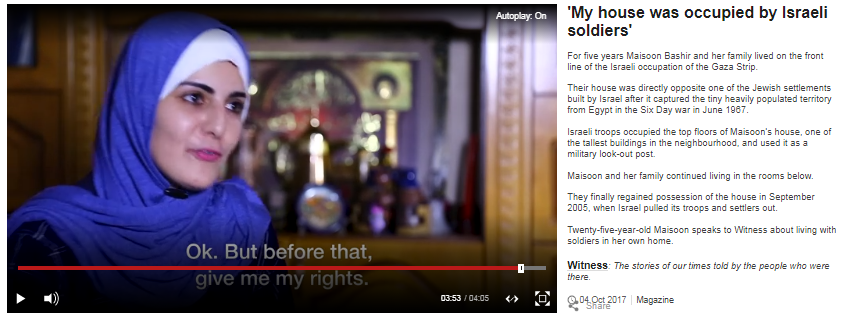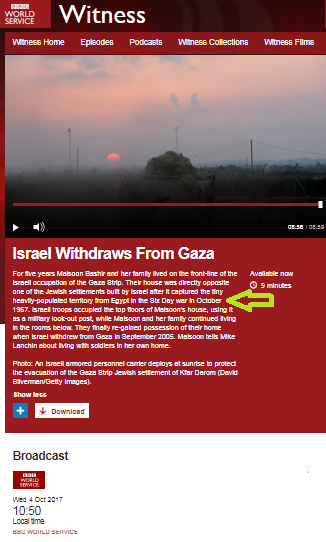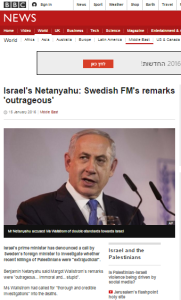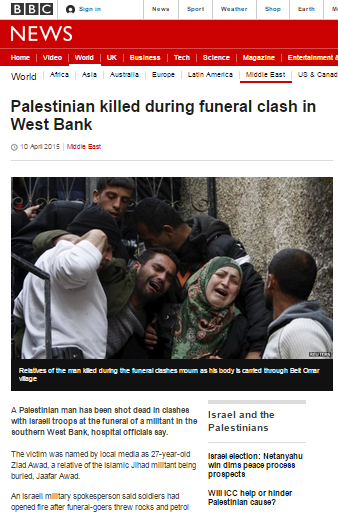The subject matter of programmes in the BBC World Service radio history series ‘Witness‘ is often tied to an anniversary on or around the time of broadcast. That, however, was not the case in the programme’s October 4th edition – titled “Israel Withdraws From Gaza“.
Unusually, presenter Mike Lanchin travelled to the Gaza Strip to make a programme less than nine minutes long and also produced a filmed version which appeared on the BBC News website’s Middle East page on October 4th under the title “‘My house was occupied by Israeli soldiers’“.

In the audio version listeners heard a substantial amount of commentary from Lanchin himself, much of which was inaccurate and failed to provide them with the full story. In his opening words, Lanchin described the Gaza Strip as “Palestinian territory” without providing any explanation of the area’s history – and not least the fact that it was included in the territory designated by the League of Nations for the creation of the Jewish homeland.
[emphasis in italics in the original, emphasis in bold added]
Lanchin: “Today we’re going back to 2005 when Israel completed its withdrawal from the Gaza Strip after nearly 40 years of occupation. Around 8,000 Jewish settlers were evicted and all Israeli military personnel were withdrawn from the tiny Palestinian territory. I’ve been hearing from one young Gazan woman who was there when the Israelis left.”
Listeners then heard archive recordings from the time of the 2005 disengagement followed by the programme’s sole interviewee, Maisoon Bashir.
Bashir: “The people in the settlement they are very upset and angry because they don’t like to leave Gaza. And we hear the sound of the people in the settlement shouting ‘no; we don’t leave’.”
After a similar archive recording, Lanchin went on to present an editorialised account of the disengagement.
Lanchin: “There’d been weeks of violent confrontations between Jewish settlers and Jewish policemen and women and soldiers; a cause of anguish and shame for many Israelis. But now Israel’s 38 year occupation of Gaza was at an end. For 12 year-old Gazan Maisoon Bashir it was a moment of celebration.”
Bashir: “I was so happy because the simple thing that I am Palestinian, this is my land and you have to leave. And yes; they did.”
Following a recording of some sort of military confrontation, Lanchin purported to provide some historical background but could not even get the date of the Six Day War right – and that inaccuracy also appeared in the programme’s synopsis.
Revealingly, Lanchin described that war as ‘Israel’s’ war and failed to clarify to listeners that the Gaza Strip had been belligerently occupied by Egypt in 1948 and that Jordan had belligerently occupied Judea and Samaria and parts of Jerusalem during the same conflict.
Absurdly describing an area which is between 30 to 55 kilometres wide as being “on the west bank of the River Jordan”, Lanchin inaccurately suggested that the people who chose to go to live there and in the Gaza Strip were ‘moved in’ by Israel. That inaccuracy also appeared in the filmed version in archive material from Jeremy Bowen and of course the accuracy of terminology is important because it is that false account of events which is used as the basis for the claim that Israeli communities in those areas are (or were) ‘illegal’.
Lanchin: “Israel had first captured the 40 kilometre long and 10 kilometre wide Gaza Strip during its Six Day War with Egypt, Jordan and Syria in October 1967. It then began moving its own people in – both to Gaza and to the newly occupied territories on the west bank of the River Jordan. Over the next three decades, thousands of Jewish settlers set up home in heavily populated Gaza. One of the settlements – Kfar Darom – was built opposite Maisoon Bashir’s family home.”
Lanchin made no effort to inform listeners that the community of Kfar Darom was first established as a kibbutz in 1946 on land purchased in 1930 by a Jew from Rehovot called Tuvia Miller or that a Jewish community had existed in Gaza until 1929, when it was evacuated by the British mandate administration due to Arab rioting.
Bashir: “I remember just opening the windows of my room. I see the soldier in the settlement. When I ask my father who is here in this place? They are Jewish people.”
Lanchin: “It was a sight that Maisoon grew up with just across the dusty road from her home. Jewish settlers – many of them with young families – living in large, well-built compounds with schools, synagogues and shops, protected by Israeli soldiers. Maisoon’s family had lived in that part of central Gaza for several generations and had tomato and date plantations there. Her father was an English teacher and the principal at the local school.”
Bashir: “I remember that we go to the sea with my father in vacation, play in the garden, go with my grandfather to the greenhouses – the tomato greenhouses – and I remember that my aunts they visit us, my friends. So you feel like you are a normal person.”
Nowhere in his report did Lanchin make use of the words terrorists or terrorism. Instead terrorists were described as ‘militants’ and listeners heard practically nothing about the scores of fatal and debilitating attacks (including rocket and mortar fire) against Israeli civilians living in communities in the Gaza Strip.
Lanchin: “But for Maisoon and her family such moments of normality were rare. Militant attacks on the settlements were becoming increasingly common. In 2000 there was an upsurge in the violence both in Gaza and in the occupied West Bank.”
Following an archive recording from the time of the second Intifada, Lanchin went on to repeat an inaccurate narrative frequently promoted in BBC content.
Lanchin: “The second Intifada – or uprising – against the Israeli occupation was sparked by a visit by the then Israeli opposition leader Ariel Sharon to the holy site of Haram al Sharif – or Temple Mount – in the Old City of Jerusalem.”
After another archive recording, Lanchin allowed Bashir to promote memories of unsupported speculation.
Lanchin: “Maisoon was at home when she first heard gunfire close by.”
Bashir: “The first thing that we hear that shooting from the Israelien [sic] soldiers – very heavy – and we feel like they would kill us. We were in this room. My father was in a school and my mother ask all of my brother and sister to enter this room because it’s the most safe one.”
Lanchin: “The next day more Israeli soldiers arrived and they proceeded to tell the family that they had orders to occupy their home, claiming that it had a strategic position as the tallest building in the neighbourhood.”
Bashir: They put all my family in one room and the rest of home was the things of the soldier. And they told my father that this place is like a military place. You have to understand that no-one allowed to enter your home and you cannot use the rest of your home. Soldiers live here and there so I feel like this is not my home. I ask my mother what’s that?”
Lanchin: “Friends and relatives begged Maisoon’s father to leave.”
Bashir: “My father say no. This is my place of my grandfather and I will die here.”
Lanchin: And so for the next five years Israeli soldiers occupied the top floors of the house, using it as a look-out post, while Maisoon and her brothers, sisters, mother and father were confined to the rooms down below. The family was allowed out in the day time but had a strict night-time curfew and strict controls on who could come and go. Their land round the house was destroyed.”
Lanchin failed to clarify why a plantation of trees would likely be seen as a security risk in a location in which terrorists repeatedly attacked a nearby civilian community. He then allowed Bashir to suggest that she did not have free access to school despite bringing no evidence to support that allegation.
Bashir: “I keeping all the night dreaming the day that the Israeli soldier will leave my home, my house, so I can go freely to school and do whatever I want.”
Lanchin: “But for Israel Gaza was proving a difficult occupation to maintain. Palestinian militant attacks inside Israel – many planned from within Gaza – were on the increase. Israeli military operations in response only served to strengthen the Gazans’ hatred of the occupiers. And so, by now prime minister Ariel Sharon unveiled plans to leave Gaza and to build a wall and a fence to separate the Palestinian territories from Israel as a way of defending against further militant attacks. By September 2005 the last of the 3,000 Israeli soldiers and the 8,000 Jewish settlers had left Gaza. As they pulled out, they destroyed their former homes, schools and synagogues.”
In fact the synagogue in Kfar Darom, along with several others, was not “destroyed” by Israel but was burned down by Palestinians shortly after Israel’s withdrawal from the Gaza Strip.
Listeners then heard a conversation between Lanchin and Bashir that took place in Gaza.
Bashir: “The whole thing that we see right now here is completely change.”
Lanchin: “Yeah, there’s no sign of the settlement now. There’s some rubble in the back.”
Bashir: “I trying to remember.”
Lanchin: “Trying to remember.”
Bashir: “Yeah.”
Lanchin: “More than a decade on, I’m with Maisoon on the flat rooftop of her home which once served as a military look-out for the Israeli soldiers.”
Bashir: “And here was like the road for the Israelien [sic] jeep and the bulldozer and this place for the soldiers here.”
Lanchin’s closing remarks failed to adequately clarify to listeners that the Israeli disengagement from the Gaza Strip did not bring an end to Hamas terrorism against Israeli civilians – or why. While describing the territory as “largely closed off to the outside world” he failed to explain the role of Hamas’ policies in creating that situation and refrained from explaining that under the terms of the Oslo Accords the Gaza Strip’s coastal waters and airspace remained under Israel’s control and that no changes were made to those terms in subsequent agreements between Israel and the PA signed after Israel’s withdrawal from the Gaza Strip in 2005.
Lanchin: “On this scorching sunny morning in central Gaza it’s hard to imagine the tension and fear that dominated the lives of people like Maisoon and her family. Yet all you have to do is look around at the half-standing buildings damaged in the repeated military confrontations that have taken place since withdrawal between Hamas militants who now rule Gaza and the Israelis and you’ll understand how little has been achieved in the intervening years. Today Gaza remains largely closed off to the outside world with its borders, airspace and waters controlled by Israel and Egypt. Hamas still threatens more attacks on Israel. Maisoon – who’s now 25 – longs to go abroad to study and although she comes across as a confident young woman brimming with energy, when she speaks there’s a sadness and a resignation underlying her words.”
Bashir: “I used to be a positive – as my father told me – but you have to look to the reality and the reality right now is a very difficult. I wish that in the future it will be like Palestinian, Jewish together to speak and doing. OK but before that, give me my rights.”
Lanchin: “Maisoon Bashir was speaking to me, Mike Lanchin, in Gaza for this edition of ‘Witness’.
This report by Mike Lanchin is not, as noted above, timed to coincide with an anniversary and its featured interviewee does not have a particularly historically important story to tell. One might therefore wonder why Lanchin travelled all the way to the Gaza Strip to interview a specific person who was a child at the time of the disengagement.
Maisoon Bashir describes herself as follows:
“I have been asked to introduce myself. I am wondering how I should, as an activist or a journalist, who tries to raise the voice of Palestine? Both are true, but I prefer to introduce myself just as a Palestinian girl, because my nationality is a testament to the authenticity of my homeland and the injustices borne by my people.”
Her activism is given a platform at a site called ‘We Are Not Numbers’ that is linked to a political NGO currently called ‘Euro Med Rights’ (which has Richard Falk as chair of its board of trustees) and which was founded by a self-described “social justice activist” called Pam Bailey who is also associated with Code Pink. Bashir’s writings have also been posted at the Hamas linked outlet MEMO.
BBC audiences, however, were not informed that they were in fact listening to a political activist (in breach of BBC editorial guidelines on impartiality) and neither were they given any insight into how Mike Lanchin was introduced to her story or why he visited the Gaza Strip (where the BBC has a staffed local office) to interview her.
Once again we see that the radio show touted by the BBC World Service as a ‘history’ programme is in fact used as a vehicle for the advancement of one-sided political narrative.
Related Articles:
BBC World Service misleads on Jewish immigration to Mandate Palestine
BBC exploits Sharon’s death for more promotion of second Intifada falsehood
Resources:
Programme e-mail: witness@bbc.co.uk
Programme Facebook: https://www.facebook.com/bbcwitness
BBC World Service contact details




